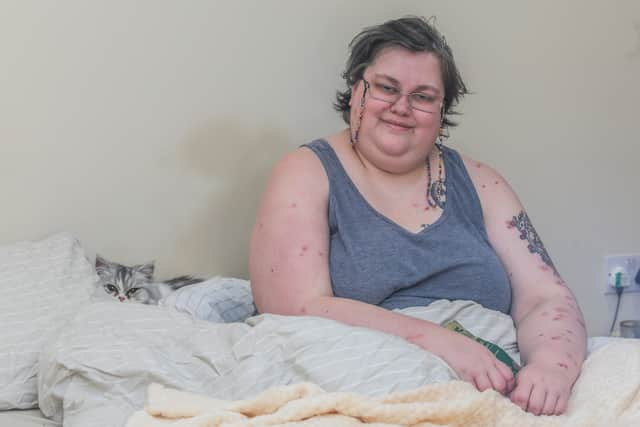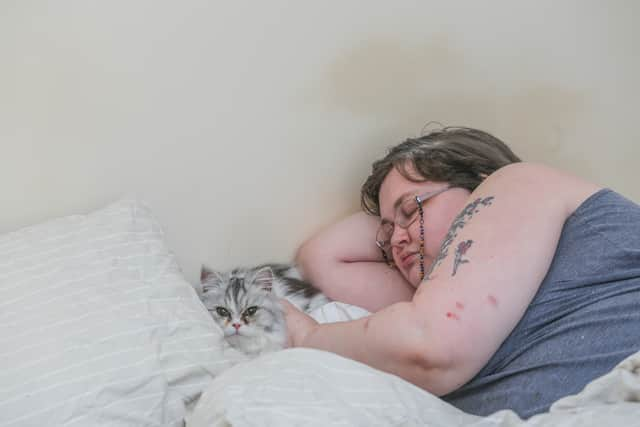‘My clever cat can detect my epilepsy seizures eight hours before they happen’
and live on Freeview channel 276
A cat owner from Birmingham who suffers from epilepsy says her pet can detect her seizures- eight hours before they occur.
Molly Brooke, 30, can experience up to nine epileptic attacks a week, leaving her body stiff and an "uncontrollable tingling" in her arms and legs. After being diagnosed with the condition aged eight, she has struggled to manage her condition - until her feline friend came along.
Advertisement
Hide AdAdvertisement
Hide AdIn September 2023, Molly paid £300 for pedigree Maggie, a four-month-old Persian kitten. Within weeks, Molly, who can't work due to her condition, noticed that Maggie's behaviour would change just before a seizure.
Molly, who lives in assisted living in Kingstanding, said: "I got her as a companion but she's turned out to be so much more. Within the first week of having her, I noticed she'd go into manic mode and become playful by running around working all her energy.
"Then she then calmed down completely and went into monitor mode, not leaving my side. If I got up to leave the room to get a cup of tea, she'd follow me. When this kept happening, it clicked that she was looking out for me because cats can sense chemical changes in our bodies.
"During my seizures, she'll lie on my arm and encourage me to stroke her- like she's trying to distract me. This is all her choice, she's just acting on instinct. It's so touching that she is looking out for me."
Advertisement
Hide AdAdvertisement
Hide Ad

After an early diagnosis, Molly struggled with socialising and going out alone due to the severity of her symptoms. Molly, who also has autism, has taken medication clobazam and zomizipide since the age of 18-years-old to help manage her seizures but has since had to increase the dosage after building up a resistance.
"Because I have autism as well, it affects how my brain works and in turn how effective the medication is," Molly said. "Being diagnosed with epilepsy so young was a good thing because I never had a typical social life for someone my age.
"Things like having a normal line of work, learning how to drive and or going to university were never on the cards for me, so in a way, I'm grateful for my early diagnosis as it's saved me a lot of disappointment. I think it would've been harder if I had those aspects of freedom taken away from me as an adult."
Molly debated getting a mixed-breed cat, but there were certain personality traits that Molly was after, so she researched reputable breeders. "As I was a first-time cat owner and disabled I was after a breed that was geared towards being indoors,'' she said.
Advertisement
Hide AdAdvertisement
Hide Ad"When I first clicked onto the site, there was a picture of Maggie front and centre with her litter and she immediately caught my eye. I messaged the breeder and asked lots of questions about her temperament and they sent me lots of photos and videos of her that confirmed she was the one for me.''


After arranging for Maggie to be delivered to her, the cat started picking up on her owner's condition ''almost immediately''. "Cats have around 30 receptors in their nose which means Maggie can pick up on chemical changes in my body,'' Molly said.
"This enables her to alert me in her special way. Sometimes she's way ahead of me and knows up to eight hours before my seizure. When they happen, which is usually in my sleep, she'll put her head up to mine.
''Her affection helps take my mind off what's happening to me and is very calming. But being near or sitting in my lap when having a seizure, she helps stabilise my movement.
Advertisement
Hide AdAdvertisement
Hide Ad"When she's not looking after me, she's very laid back but loves a play now and then! Her favourite treats are freeze-dried shrimps and she's obsessed with plastic bottle lids.
"She's always eyeing up my drinks and I, of course, give in every time- she'll bounce the lid around and then carry it off in her mouth. I've had this condition all my life and it can be a really scary and lonely place but now I feel not so alone. She's the best cat I could've hoped for and my very best friend."
Comment Guidelines
National World encourages reader discussion on our stories. User feedback, insights and back-and-forth exchanges add a rich layer of context to reporting. Please review our Community Guidelines before commenting.